The Haswell Ultrabook Review: Core i7-4500U Tested
by Anand Lal Shimpi on June 9, 2013 9:00 AM ESTCPU Performance
With Haswell on the desktop we showed a 0 - 19% increase in performance over Ivy Bridge at the same clocks. With Haswell ULT, similar parts have identical turbo frequencies but Haswell does drop the base clock by 100MHz in this case. There’s also a lower TDP, and that TDP now includes the PCH as well, potentially decreasing the time spent in max turbo.
The end result is effectively no gain in performance across our benchmarks. PCMark 7 and single-threaded Cinebench show a 3 - 6% increase in performance, while multithreaded Cinebench and x264 show a 3 - 5% decrease in performance.
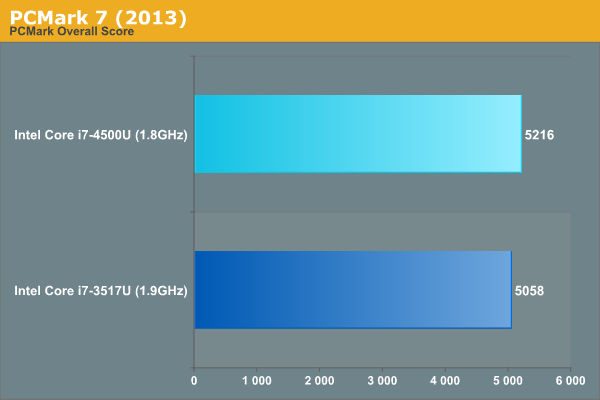
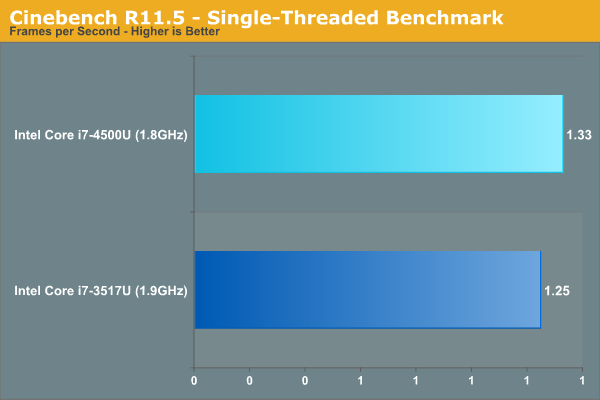
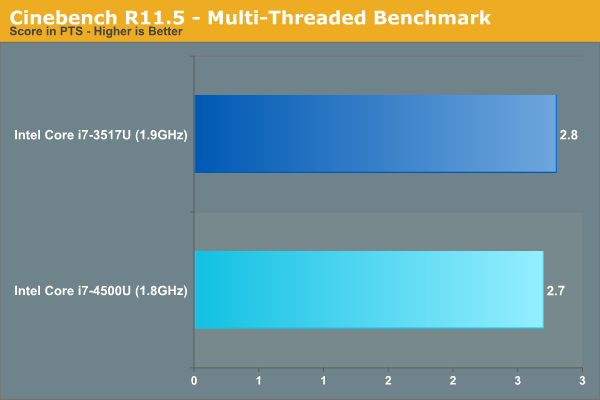
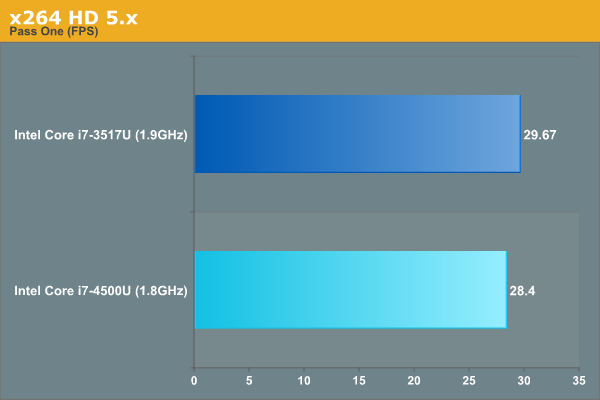
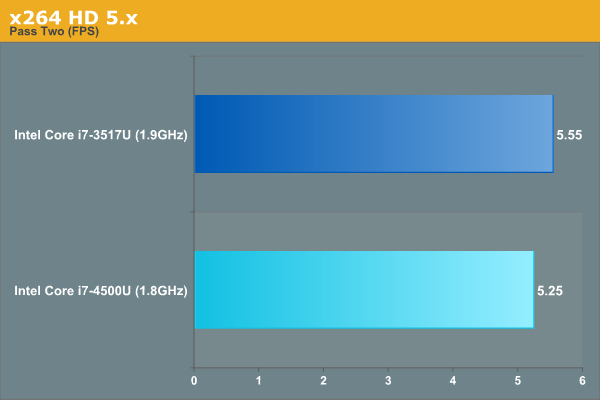
As we saw in our battery life tests, it looks like there are some larger performance gains to be had in power limited scenarios. The explanation there makes sense. Haswell ULT’s lower TDP may cap max frequencies more than on Ivy Bridge, but at lower frequencies the CPU cores are less likely to bump into the chip’s TDP limits - allowing Haswell’s IPC advantage to really shine. When plugged in however I wouldn’t expect CPU performance any different from Ivy Bridge.
| CPU Performance Comparison | ||||||||
| PCMark 7 | Cinebench 11.5 (single threaded) | Cinebench 11.5 (multithreaded) | x264 5.0.1 - 1st pass | x264 5.0.1 - 2nd pass | PCMark 8 Home (Power Saver) | PCMark 8 Creative (Power Saver) | ||
| Core i7-3517U | 5058 | 1.25 | 2.8 | 29.67 | 5.55 | 1595 | 1391 | |
| Core i7-4500U | 5216 | 1.33 | 2.7 | 28.4 | 5.25 | 1777 | 1583 | |
| Haswell Advantage | 3.1% | 6.4% | -3.5% | -4.3% | -5.4% | 11.4% | 13.8% | |










87 Comments
View All Comments
StealthGhost - Sunday, June 9, 2013 - link
Is PCMark 8 Home less demanding than 1080p video? If not, it doesn't seem like the Asus can call itself an Ultrabook.Still, impressive gains in battery life. I hope this will carry over, to some extent at least, into the CPUs that will be in laptops like the MacBook Pros. Guess we will have to see when that review comes out =)
StealthGhost - Sunday, June 9, 2013 - link
*AcerDeath666Angel - Sunday, June 9, 2013 - link
As far as I know the Ultrabook specs don't define a minimum luminance for the display. So Anand's test isn't relevant for the Ultrabook spec.axien86 - Sunday, June 9, 2013 - link
Laptopmag just reviewed the Sony Vaio based on the i7-4500u and they also noted that performance wise the Haswell offered marginal improvement over Ivy Bridge laptops, while battery life was indicated as improved.One important characteristic that most laptop users want to know is regards to heat and fan noise. Laptopmag found that the Haswell i7-4500u based Sony Vaio found that the back of the laptop "reached a more troubling 110 degrees." They also found fan noise was definitely noticeable in a quiet room just running Word and a Youtube video.
http://www.laptopmag.com/reviews/laptops/sony-vaio...
The question is, why hasn't Anandtech run extensive temperature and noise characteristic analysis on Intel Haswell processors and your current laptop?
Kristian Vättö - Sunday, June 9, 2013 - link
Likely because of lack of time. As Anand said in the article, he got the unit while in Computex, so basically he did the review between meetings. I'm pretty sure he didn't have the equipment with him to do temperature or noise tests properly but I'm sure this is something that will be tested in later reviews.Also, keep in mind that heat and fan noise are system-dependent. If the Vaio has poor cooling, then it will be hot and loud but that's not Haswell's fault (I'm not saying this is the case but we obviously need more reviews before any conclusions can be drawn).
mavere - Sunday, June 9, 2013 - link
"The question is, why hasn't Anandtech run extensive temperature and noise characteristic analysis on Intel Haswell processors and your current laptop?"The WHr of battery that a laptop consumes is the exact same thing as its heat output.
Anand is trying to test the Haswell platform, not the design deficiencies of any specific manufacturer. Sony's problems are its own.
n13L5 - Sunday, June 9, 2013 - link
Cause they had to run their test in Taiwan with a borrowed machine?I was rather disturbed by the temperature of Sony's Vaio Pro, as well as the instability of the carbon case, which must be paper thin... And their keyboard backlight has the worst bleed I've ever seen, they should have a look at Lenovo and Samsung keyboards...
Well, I'll be waiting for more tests and the ULT Haswell with the Iris 5100 GPU. Maybe that'll rack up a high enough temperature to fry a steak.
akbisw - Monday, June 10, 2013 - link
Sony has terrible cooling system in their laptops in general. The worst I have seen done by any manufacturer. Even my my old acer before their "reiteration" had better cooling design than current VAIO systems.Dnann - Friday, June 14, 2013 - link
He probably didn't have the time considering the circumstances...DanNeely - Sunday, June 9, 2013 - link
The fact that companies historically known for horrible battery life are getting good results out of Haswell with Intel's help is promising; but starting from such a horribly low baseline makes getting gains much easier. I'm much more interested in seeing what companies who've historically offered good battery run times will be able to do with Haswell.